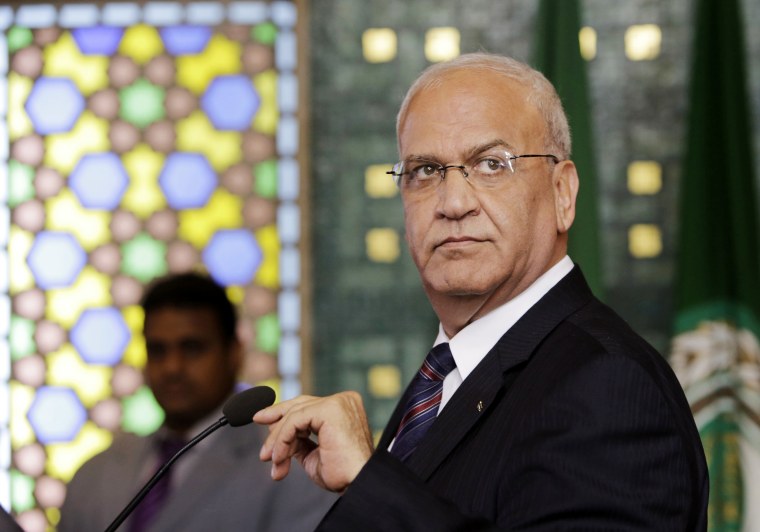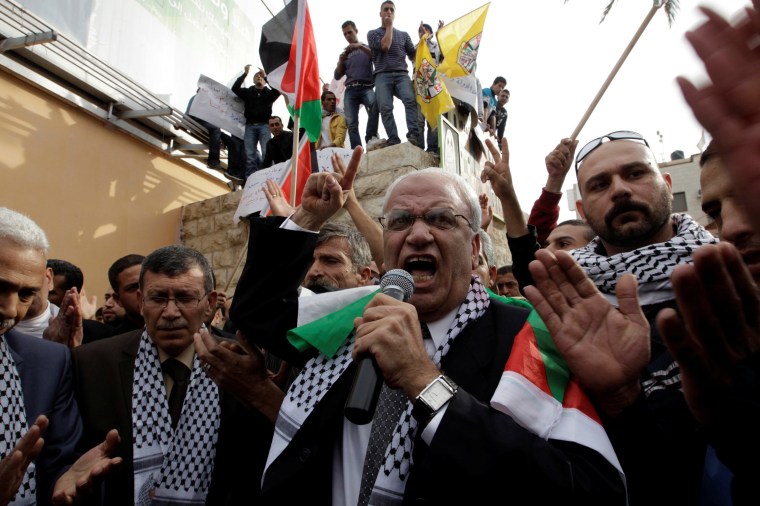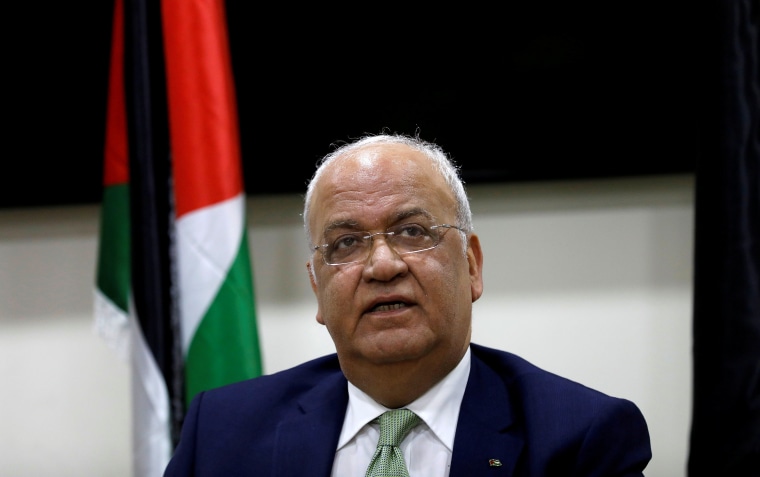JERUSALEM — Saeb Erekat, a senior Palestinian politician and veteran peace negotiator, has died weeks after testing positive for the coronavirus. He was 65.
A spokesperson for Hadassah Hospital in Jerusalem confirmed to NBC News that he had passed away.
The hospital said Erekat was admitted last month infected by the coronavirus and in a "critical condition." Erekat, who had previously had a lung transplant, passed away following multi-organ failure, the statement added.
One of the most recognizable faces among the Palestinian leadership, for decades Erekat served as a senior negotiator in talks with Israel, often donning a black-and-white checked Palestinian kaffiyeh scarf.
He is survived by his wife, Niaama, and four children — two daughters and two sons.
Erekat's family said he had passed away “peacefully" on Tuesday.
“Saeb has shown an extraordinary patience and resilience, with the same determination that has characterized his career to achieve freedom for Palestine and a just and lasting peace in our region,” his family said in a statement.

Palestinian Prime Minister Mohammad Shtayyeh addressed Palestinians live on television Tuesday announcing three days of mourning and said that the Palestinian flag would be flown at half-mast.
The Trump administration’s former Mideast envoy Jason Greenblatt was also among those to publicly offer his condolences to Erekat’s family on Twitter.
“Saeb and I were worlds apart in our views of the Israeli-Palestinian conflict, it’s history & how to resolve it. But he tried hard to represent his people,” Greenblatt tweeted.
Born in east Jerusalem in April 1955, Erekat spent most of his life in the city of Jericho in the West Bank.
A political science professor, he studied international relations at the University of San Francisco and earned a doctorate in peace studies from the U.K.'s University of Bradford. He went on to teach at universities in the West Bank, where he authored dozens of books.
Much of his academic political work, however, was put to the test in real life.
Over the course of decades, Erekat served in a number of roles in the Palestine Liberation Organization (PLO), including minister of local government, chairman of the negotiation delegation and later secretary-general.
As a negotiator, he was instrumental for both the Palestinians and the Israelis, according to Yossi Beilin, a former Israeli Cabinet minister and one of the chief architects of the historic 1993 Oslo peace process with the Palestinians, who spoke to NBC News before the news of Erekat's death.
"He is indispensable because of his knowledge and also he wished to make peace," Beilin said. "You have other negotiators on both sides who are coming to negotiate in order not to agree, this is not him."
Beilin, who said he had met and negotiated informally with Erekat countless times over the years, described Erekat as a "walking archive" who embodied a rare combination of loyalty and knowledge.

Erekat's purported eye for detail and fluent English saw him become a senior adviser to the likes of Yasser Arafat, the PLO leader who died in 2004 and President Mahmoud Abbas.
For the bespectacled Erekat, the conflict with Israel was personal.
His nephew Ahmad Erekat was shot in June by Israeli police after they said he tried to ram his car into a military checkpoint — an account his family and others have denied. They said Ahmad was rushing to nearby Bethlehem to pick up family members from a hair salon on his sister's wedding day.
His negotiating days dated to the earliest public negotiations with Israel in 1991 at the Madrid Conference, during the presidency of George H.W. Bush.
Erekat was a tough negotiator who long advocated for a two-state solution based on borders from 1967.
″We have to learn maybe how to live as neighbors, how to exist as neighbors," he said on the sidelines of peace talks in 1991. "We are offering a rapprochement."
Download the NBC News app for breaking news and politics
In 2011, he abruptly resigned his positions within the PLO after taking responsibility for the release of some 1,600 secret documents relating to more than a decade of peace maneuvers with Israel, a move marked as a low point in the peace process.
The Palestine Papers, as they were later dubbed, showed that Erekat and his fellow negotiators had made more concessions to the Israelis than had previously been made public.
But Erekat remained an outspoken critic of Israel, as the seemingly insoluble conflict persisted.
In recent times, he frequently took to social media to accuse Israel of depriving Palestinians of land, resources and access to jobs and healthcare.
In 2019, as Benjamin Netanyahu celebrated becoming Israel's longest-serving prime minister, Erekat said the Israeli leader would be remembered as the one who "buried" the peace process and paved the way for a future apartheid state.
"I think his legacy will be his success in making sure that any ray of hope to achieve peace based on two states along the 1967 border is blocked," he said.
This year, in a further blow to the Palestinians, the United Arab Emirates and Bahrain became the first Gulf Arab countries to enter into deals with Israel to normalize relations, undercutting an Arab consensus that the recognition of Israel should happen only in exchange for a Palestinian state.
Erekat had underlying health conditions, including a heart attack in 2012 and a lung transplant in the U.S. in 2017.
He tested positive for the coronavirus on Oct. 8.
Reuters and The Associated Press contributed to this report.

